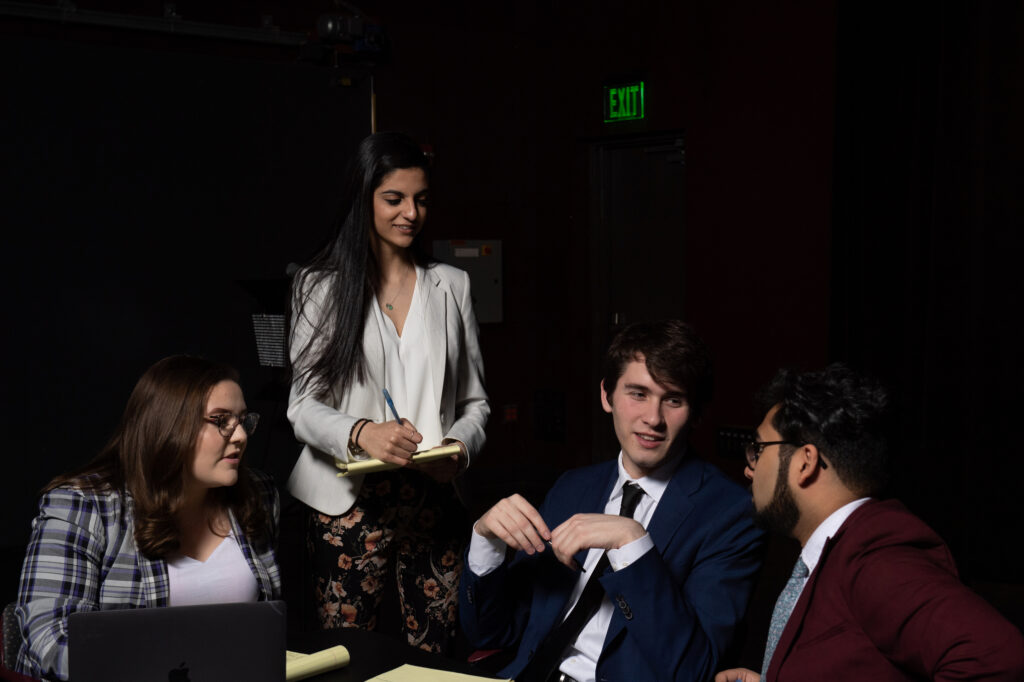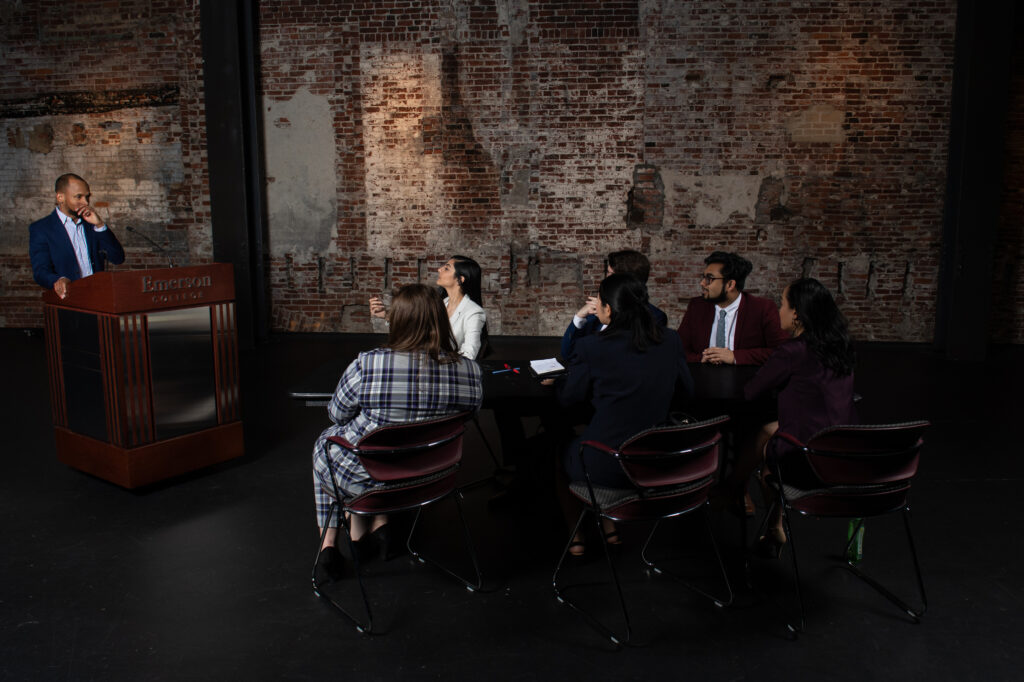Debating the Pros and Cons of Virtual Forensics

By David Ertischek ’01
As Emerson’s forensics team has transitioned from in-person tournaments to debating over a screen, they’ve encountered a number of new topics to navigate: different rhetorical styles, socialization with teammates and opponents, even what to wear.
Some of what makes debating in person exciting has undoubtedly been lost, but for some, going remote has opened up new opportunities.
“There’s a lot of thing we miss about debating in person. But what’s really cool for virtual debates is the amount of competitions expands significantly,” said Jenna Dewji ’21.
“During the season we stay in the northeast region, but now we can compete with individuals in California or Texas,” she said. “[In a recent tournament] I was competing with individuals in Oklahoma. We see a diversity in the types of debaters [in virtual competitions]. Usually, it’s the same people every weekend.”
Communications Studies Assistant Professor Deion Hawkins, director of Emerson’s debate team, said accessibility has grown exponentially. The team usually leaves on Friday for a weekend tournament, but if a student works until late Friday they can’t go on the trip. Now, all they have to do is click on a link wherever they are.
On the weekend of November 14 and 15, the debate team competed in a Cornell University competition. But instead of hitting the road for hours in cars, they sequestered themselves in individual rooms in Boston. For the Cornell competition, Dewji was in Hawkins’ office, while Hawkins was in a nearby conference room.
Dewji won all her debates on the first day, and won two debates and lost one the following day.
On the downside, it’s harder to sustain energy and build camaraderie over laptop.
Sara Hathaway ’22 said in-person tournaments provide adrenaline to debaters. It’s an intense environment with four hour-long preliminary rounds. Teammates get to watch each other debate, and watch opposing teams debate.
“It’s fun to see people and debate people we’ve debated before,” said Hathaway. “We’ve made friends with people on their team, and it’s fun to beat them.”
Hawkins said the team truly becomes a family by being with each other on trips that start on Friday mornings. Teammates bond and socialize together through those long car rides, team dinners, awards celebrations — and those things don’t exist with virtual debates.

“I will say the act of debating hasn’t changed much. The culture of the team and the activity is different,” said Hawkins. “You develop a network and friends, but the ability to not go to a tournament means there’s no exchanging of ideas. In a typical tourney [you ask your teammate], ‘What did you just see?’ ‘I just saw people debating if Breaking Bad is the best show of all time?’ ‘Oh, I just talked about the Senate.’ In that environment there’s constant sharing in person.”
Hawkins said nonverbal cues are also lost in virtual competitions. Students had to get used to competing in front of a screen instead of live judges. Hawkins encourages the team to treat the computer as if it were a judge.
“Use whatever imagination needed to make that happen. The whole country is doing this. Everyone in forensics is having these problems,” said Hawkins. “The whole forensics world transitioned to online.”
Dewji said the team practiced differently this semester. They prepped before their online Wednesday practice. That enables teammates to see how each would handle a debate topic.
“Will [Rawley] and Sara always look at things politically. Jack [Deignan] looks at things metaphorically,” said Dewji. “One of my resolutions was that civil disobedience is a ticking time bomb. What we consider a ‘Jack thought’ is the bomb has already gone off and civil disobedience is the response. I would think if it’s doing something for the economy, it’s not a ticking time bomb.”
Hathaway said she doesn’t feel like she had to prepare differently for virtual competitions.
“Universally, if you know good structure [to debate] then that’s going to help you. That was the first thing that Deion focused on when we got on the team,” said Hathaway.
The team has also practiced by performing showcase debates for the School of Communication for International Week, and the Emerson Prison Initiative (EPI). Showcase debates provide good practice, because the team knows the topic beforehand. For the EPI showcase, the debate team discussed if education in prisons is a human right.
Whether it’s an advantage or not, debaters can dress differently for virtual competitions because only the upper body is seen by viewers.
“It was really nice on Sunday that I didn’t need to wear a full suit. Just a nice shirt and blazer, and went in sweatpants,” said Dewji.
Maybe a future debate topic will be what’s the psychological effect on debating fully or half dressed up.
Categories